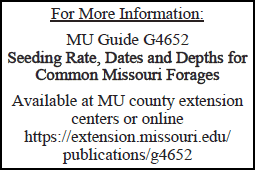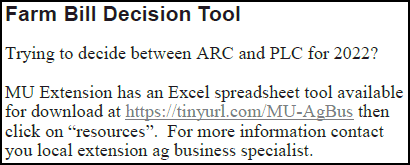

To send a message to an author, click on the author's name at the end of the article.
This Month in Ag Connection | Ag Connection - Other Issues Online
Red clover is a short-lived perennial legume and is widely utilized in Missouri. It is well adapted to the soil and climate, and grows well in mixtures with cool season grasses, like tall fescue, bromegrass and orchardgrass. It is susceptible to drought and root diseases, but due to its ease of establishment and generally affordable seed cost, it can be reseeded easily. Alsike clover is found in many pastures in Missouri, but is less productive than red or white clover; it withstands wet soil conditions and flooding better than many other legumes. White clover also tolerates poorly drained soils, but is not drought tolerant and can cause bloat if fed as a large portion of an animal's diet.
The most common way to seed clover is to frost seed in February or March. Graze pastures to a height of three or four inches prior to seeding to allow sunlight to penetrate the canopy once the seed germinates. Seed is broadcasted on frozen ground which allows freezing and thawing to work the seed into the soil. Planting clover at a rate of three to six pounds per acre, every one to three years, will maintain the stand in pastures and hayfields. Clovers can be seeded in April, but is best to drill in late spring rather than broadcast to ensure good seed to soil contact.
Lespedeza, a summer annual legume, can also be frost seeded at a rate of eight to ten pounds per acre in February or March. It is better suited to areas with low soil pH and fertility and withstands drought better than clovers.

Avoid applications of nitrogen fertilizers to pastures and hayfields where legumes are present. Grasses begin growing earlier in the spring than legumes and the addition of nitrogen fertilizer causes grasses to out compete legumes for sunlight, nutrients and moisture. Legumes fix nitrogen, some of which is available to companion grasses, making it unnecessary to apply additional nitrogen fertilizer.
In order to fix nitrogen, the legume seed must be inoculated at seeding with rhizobia bacteria. The bacteria needed is specific to the legume being planted. Seed should be inoculated with the proper rhizobia bacteria to maximize the nitrogen fixation of the legume.
For more information contact the local MU Extension agronomy specialist.
Source: Valerie Tate, Agronomy Specialist
This Month in Ag Connection | Ag Connection - Other Issues Online
Timely decision making is an essential part of daily operations on farms and ranches. Some decisions have minimal consequences and others greatly impact the operation. Often decisions are routinely made by one person. It is important others know how to proceed if that one person is suddenly unable to make decisions.
A team of MU extension ag business specialists developed a short-term operating planning tool. The tool can be helpful to family members when the primary decision maker(s) cannot make short-term decisions. Short-term is generally a couple of weeks to six months. There could be a variety of reasons why the decision maker(s) is unable to make decisions including health issues and military deployment. The purpose of the plan is to have information organized for family members to use to continue operating the farm.
The plan was designed for most types of Missouri farms and ranches. The plan is divided into seven parts: general information, livestock information, crop information, horticulture information, woodlands and timber, hunting leases and rights, equipment information. Farm families using the plan should complete only the parts needed for the operation.
This plan is available online at https://extension2.missouri.edu/publications/m202 The downloaded pdf file is fillable or can be printed. (Additional details are available in the September 2020 issue of NEMO Ag Connection). The paper copy works well, but there are limits to the amount and type of data that can be put in the plan. To make the plan easy to access at any time, there was a need to have it online so data is available via computer, tablet or phone.
Grant funds were secured last year, through the North Central Risk Management Education Center, to take the plan to an online format. MU Extension worked with the University of Minnesota to create the website, agplan.umn.edu. The partnership with the University of Minnesota was chosen because Minnesota has several planning tools on their site and the short-term operating plan fit well with existing tools on the website.
The website allows users to include more information and more customization including attachments, such as farm maps. The website contains tips and samples to help guide users. It is free to use with an email and password. Users can choose to share their plan with others. For example, a user can share it with other family members simply by adding additional email addresses.
The extension team working with the short-term operating plan is scheduling several workshops and online zoom trainings this winter/spring to share more details and help farmers start building a plan. For more information call 573-581-3231.
Funding for this project was provided by the North Central Extension Risk Management Education Center and the USDA National Institute of Food and Agriculture Award Number 2018-70024-28586.
Source: Mary Sobba, Ag Business Specialist
This Month in Ag Connection | Ag Connection - Other Issues Online
The Northeast Missouri Show-Me-Select® replacement heifer sale averaged $2,259 at F & T Livestock Market, Saturday, December 11.
The 17 producers of the 247 heifers were enrolled in the MU educational heifer management program. The heifers were bred to sires with both calving-ease and growth genetics. The top lot sold belonged to Twin Hill Stock Farm (Silex) and brought $3,050.
The highest average price from a consignor was $2,900 on two head from long-time consignor McCutchan Angus (Monticello). Other top consignors were Keithley/Jackson (Frankford) $2,683 on 24 head; Connor Eckman (Paris) $2,575 on four head and Twin Hill Stock Farm $2,390 on 58 head.
The 43 buyers were responsible for just over $558,000 worth of bred heifers exchanging hands in one hour. Thirty-four repeat buyers purchased 206 head (83 percent of the total consignment). Calving surveys returned by these buyers provide important information that is given back to consignors to improve for future years.
The Show-Me-Select® heifer development program takes nearly a year to complete. The heifers complete a pre-breeding examination usually four to eight weeks before breeding. This exam includes a pelvic measurement, reproductive tract score, and weight. Heifers may be bred artificially or exposed to natural service, however; the service sires must meet specific calving ease Expected Progeny Difference (EPD) requirements based on breed. This year 182 head (74 percent of the heifers in the sale) were synchronized and bred by artificial insemination (AI). In this sale, the choice to AI, showed a $67 price advantage over those bred naturally.
All heifers must be pregnancy tested within 90 days of breeding by a veterinarian to determine expected calving date. The use of ultrasound has helped many of the veterinarians improve their accuracies on calving dates. During the development period the heifers undergo an extensive health program and are vaccinated at weaning, pre-breeding, and pregnancy examination as well as treated several times for internal and external parasites. Heifers are also screened for blemishes, condition, muscling and structural soundness by MU livestock specialists and USDA graders.
Averages of other Show-Me-Select® sales from fall 2021 were Joplin, $1,790 on 173 head; Kirksville, $1,882 on 223 head; Kingsville, $1,909 on 252 head; SEMO, $2,112 on 58 head; and Farmington, $1,964 on 82 head.
This was the 25th year for the Show-Me-Select® heifer sale in Palmyra and over 43,192 heifers have been through the program and 7,605 head have been sold. If interested in participating contact the local MU Extension livestock specialist.
Source: Daniel Mallory, Livestock Specialist
This Month in Ag Connection | Ag Connection - Other Issues Online
Ornamentals
Fruit
Vegetables
Miscellaneous
Source: Missouri Botanical Garden
This Month in Ag Connection | Ag Connection - Other Issues Online

This Month in Ag Connection | Ag Connection - Other Issues Online
The following list is for in-person training. Pre-registration is required with limited seating.
For questions call Valerie Tate (660)-985-5123 or Dhruba Dhakal (573) 581-3231.
Carroll County - Feb. 8 @ 10 a.m., or 1 p.m.
Carrollton Library basement 660-542-1792
Chariton County - Feb. 14 @ 10 a.m., or 1 p.m.
Chariton Courthouse big court rm 660-288-3239
Linn County - Feb. 1 @ 2 p.m. or 6 p.m.
Forage Systems Research Center 660-895-5123
Macon County - Feb. 7 @ 10 a.m. or 2 p.m. or 6 p.m.
MU Extension office 660-385-2173
Marion County - Feb. 11 @ 10 a.m., or 1 p.m.
Marion County Court Room 573-769-2177
Monroe County - Feb. 28 @ 10 a.m., or 1 p.m.
Monroe County 4-H Bldg 660-327-4158
Putnam County - Feb. 2 @ 10 a.m. or 2 p.m.
4-H Building 660-947-2705
Ralls County - Feb. 24 @ 1 p.m., or 3:30 p.m.
Mark Twain H.S. Vo Ag Bldg 573-985-3911
Randolph County - Feb. 10 @ 10 a.m., or 1 p.m.
MU Extension office 660-269-9656
Schuyler County - Feb. 9 @ 2 p.m.
Courthouse basement 660-457-3469
Sullivan County - Feb. 9 @ 2 p.m.
City Hall Community Room 660-265-4541
Shelby County - Feb. 23 @ 10 a.m., or 1 p.m.
MU Extension office 573-633-2640
Publishing Information
Ag Connection is published monthly for Northeast and Central areas of Missouri producers and is supported by the University of Missouri Extension, the Missouri Agricultural Experiment Station, and the MU College of Agriculture, Food and Natural Resources. Managing Editor: Mary Sobba.